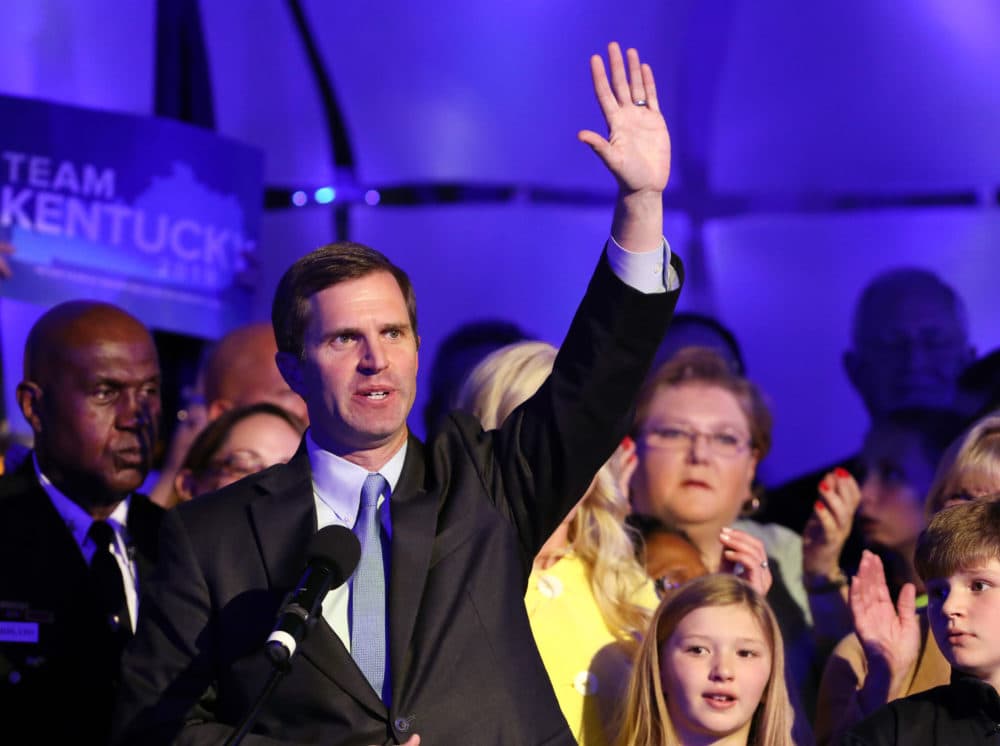Advertisement
Kentucky Governor Andy Beshear Restores Voting Rights To Felons
Resume
Kentucky’s new governor has restored voting rights to felons in the state, in an executive order signed days after he took office.
With Thursday’s order, Democratic Gov. Andy Beshear returned the right to vote and hold public office to more than 140,000 nonviolent offenders who have completed their sentences.
“I think it's critically important,” Beshear says. “Not just for democracy but also an understanding that people can make mistakes, yet they can rebuild their lives, and they ought to have the dignity of voting once they do.”
The pledge fulfilled a campaign promise from Beshear, the former attorney general who ran a close race this year against the unpopular incumbent governor, Republican Matt Bevin. Beshear won by a slim margin in a contest where Republicans swept down ballot races and President Trump threw his weight behind Bevin.
Beshear says he issued the order in part to reduce Kentucky’s disenfranchisement rate, one of the highest in the nation. Nearly 10% of adults in the state – and around 25% of African Americans – can’t vote because of a felony record, according to The Sentencing Project, the criminal justice advocacy group.
“It is an injustice,” Beshear says. “It is a racial injustice. And this executive order helps get us on track to writing a lot of wrongs.”
Kentucky was one of just two states with a blanket, lifetime voting ban on felons. Now that category includes just one state: Iowa.
And the move follows a wave of voting rights expansions for felons across the country, at the peak of a decades-long movement against disenfranchisement.
Last year, Florida restored voting rights to more than a million people with felony charges, but quickly became caught in a legal battle when the state legislature passed a law requiring felons to pay court fees, fines and restitution before voting. Civil rights groups sued over law, which they said amounts to a “poll tax.” A federal court has temporarily blocked the law.
Beshear stresses that Kentucky’s executive order does not require felons to pay fees or fines in order to exercise their right.
“The fact that someone owes money will not keep them from getting their voting rights back,” he says. “Those that have less money shouldn't have their voices squelched.”
Beshear says the state will work to avoid putting an excessive burden on felons, who register to vote and turn out at lower rates than the general population.
“Our goal is to streamline this process to where someone … in the near future, can walk into any clerk's office across Kentucky and get registered to vote,” he says. “No forms, no hassle. This is their right.”
Matt Bevin, the outgoing governor, also spoke recently about redemption in the criminal justice system, though from a different angle.
Between his loss in November and the end of his term, Bevin pardoned more than 400 people, according to the Louisville Courier-Journal, including some convicted of violent crimes. The Kentucky New Era reports that one sentence commutation went to Dayton Jones, a man who pleaded guilty to sexually assaulting a 15-year-old boy and distributing “matter portraying a sexual performance by a minor.”
Bevin told The Washington Post the United States were founded on the concept of redemption and that he’s “a big believer in second chances.”
But the pardons drew concern from some state attorneys. Jackie Steele, a prosecutor for the commonwealth, told the Post the governor’s actions were “an absolute atrocity of justice” and that the pardons put Kentucky communities in danger. Others told the Post they were blindsided and shocked.
Speaking with Here & Now, Beshear refrained from commenting on the pardons as a whole, noting that he doesn’t want to criticize his predecessor. But he says one pardon involved a case that his office had prosecuted when he was attorney general, apparently referring to Dayton Jones.
“It was an awful case where a young man in high school was attacked, was violated,” Beshear says. “It was filmed. It was sent out to different people at his school.”
Beshear calls the case one of the “worst crimes” his office had ever seen.
“I fully disagree with that pardon,” he says. “It is a shame. And it's wrong.”
In his executive order on felon voting rights, Beshear excluded people who were convicted of rape and sexual abuse, as well as other violent offenses – and some nonviolent offenses such as bribery in an election.
Some Kentuckians may be experiencing déjà vu. Former Kentucky Gov. Steve Beshear, the current governor’s father, issued a similar order at the end of his tenure in 2015, though it was promptly overturned by Bevin.
Beshear acknowledges the next governor could similarly roll back his order. But he points out that permanent, automatic restoration of voting rights in Kentucky would require a constitutional amendment. Beshear says he’ll pursue that amendment legislatively, though the process, if it succeeded in the Republican-controlled state legislature, could take years.
An executive order “means that 140,000 Kentuckians that got their voting rights restored yesterday don't have to wait those extra couple years,” he says. “I can tell you that as long as I serve, this order is going to be in effect.”
Francesca Paris produced and edited this interview for broadcast with Tinku Ray. Paris also adapted it for the web.
This segment aired on December 13, 2019.

